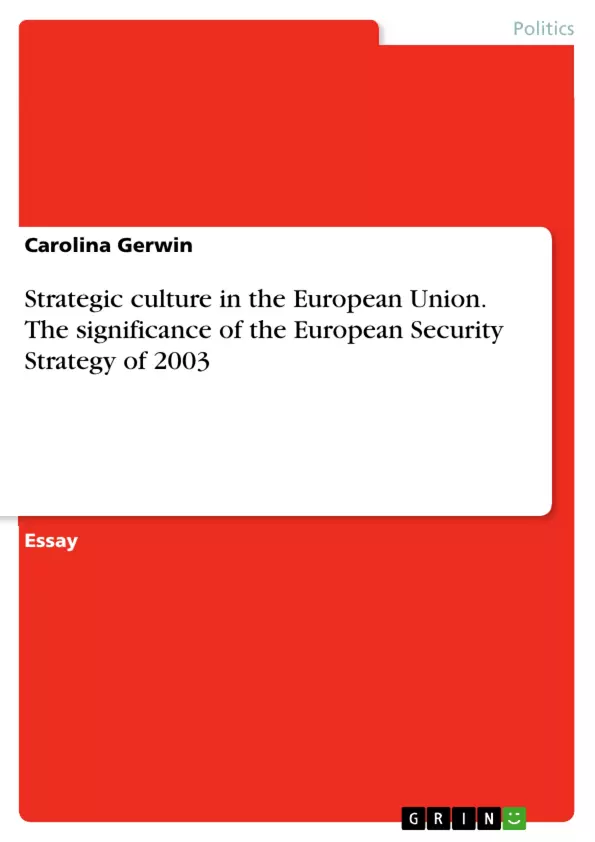The essay deals with the question whether the EU has established a strategic culture regarding its foreign and security policy. It begins with a discussion of the concept of strategic culture, to then dive into the sources of strategic culture and the extent to which the member states of the EU have similarities within those sources, namely geography and history, and political structure and institutions. Afterwards, the European Security Strategy of 2003 is considered as a potential manifestation of EU strategic culture, followed by developments after 2008. The essay concludes that the EU is growing closer to having a common strategic culture, but that it has not happened yet.
Due to significant changes with regard to the security situation after the end of the Cold War, caused by conflicts in former Yugoslavia, the attacks on September 11, 2001, and the differences regarding the Iraq war for instance, the necessity for a coordinated European foreign and security policy became evident. Therefore, on December 12, 2003, the European Council agreed to the European Security Strategy (ESS), whose development was seen as an important step in defining common interests and goals of the EU regarding foreign and security policy.
Inhaltsverzeichnis (Table of Contents)
- Introduction
- Theoretical context
- Geography and history
- Political structure and institutions
- The European Security Strategy of 2003
- Developments after 2008
- Conclusion
Zielsetzung und Themenschwerpunkte (Objectives and Key Themes)
This paper aims to investigate whether the European Union has established a strategic culture in its foreign and security policy. It explores the origins of strategic culture and examines the European Security Strategy (ESS) of 2003 as a potential indicator of a developing EU strategic culture.
- The origins of strategic culture
- The development of a European strategic culture
- The impact of historical and geographical factors
- The role of political structures and institutions
- The significance of the European Security Strategy
Zusammenfassung der Kapitel (Chapter Summaries)
- Introduction: This chapter introduces the research question, outlining the necessity for a coordinated European foreign and security policy in the wake of global security changes. It highlights the significance of the ESS in defining common EU interests and goals.
- Theoretical Context: This chapter defines the concept of strategic culture and its origins, emphasizing the importance of geography, history, political structures, and institutions in shaping a nation's strategic culture.
- Geography and History: This chapter explores the influence of geography and historical experiences on national strategic cultures, highlighting the challenges and opportunities posed by diverse backgrounds within the EU. It examines the impact of historical events, such as world wars and the Cold War, on the development of strategic cultures.
- Political Structure and Institutions: This chapter discusses the role of political systems and institutions in shaping strategic culture. It examines the differences and similarities in political structures and defence institutions among EU member states, exploring their potential contribution to or hindrance of the development of an EU strategic culture.
- The European Security Strategy of 2003: This chapter analyzes the ESS of 2003 as a key text informing actors of appropriate strategic action and explores its potential to contribute to the establishment of an EU strategic culture.
- Developments after 2008: This chapter provides a brief overview of the evolution of EU foreign and security policy after 2008, highlighting key developments and their potential implications for the development of a strategic culture.
Schlüsselwörter (Keywords)
This paper explores the concept of strategic culture, its origins, and its potential development within the European Union. Key terms and concepts include: strategic culture, European Security Strategy, foreign and security policy, national strategic cultures, historical experiences, geographical factors, political structures, institutions, convergence, divergence, and the EU as a security actor.
- Arbeit zitieren
- Carolina Gerwin (Autor:in), 2018, Strategic culture in the European Union. The significance of the European Security Strategy of 2003, München, GRIN Verlag, https://www.grin.com/document/510896



